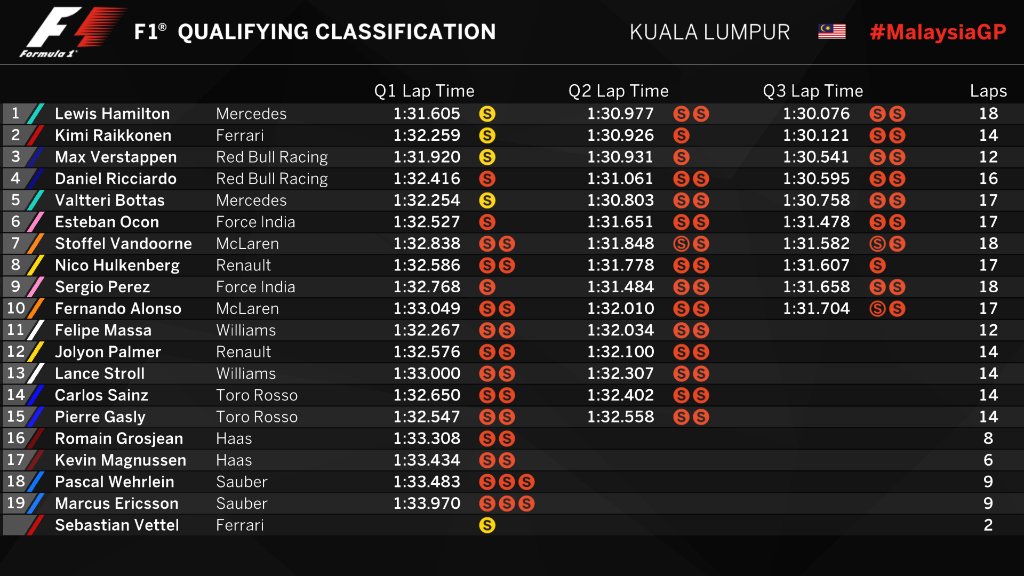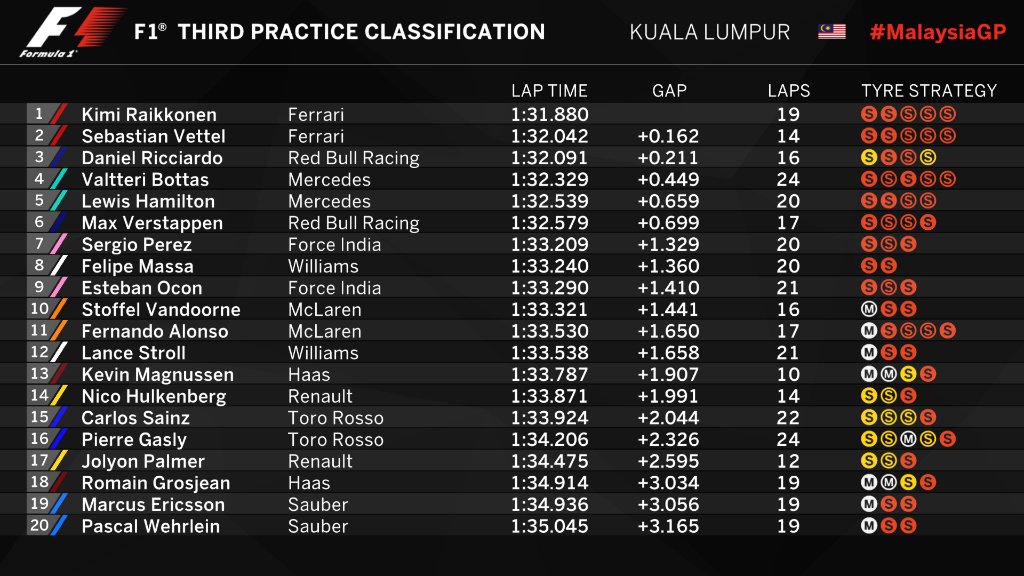Malaysia was the second country in Asia to be awarded a Formula One race in 1999. The success of the race at Sepang was the cue for the expansion throughout Asia of Formula One, with varying levels of success.
2017 sees Malaysia say goodbye to Formula One as the owners of the Sepang circuit sensibly believe that their finances would be better served if Moto GP provided the sole blue riband event at their circuit. This is, of course, an indictment on Formula One more than those who are rightly looking out for their circuit's best interests.
Down the years, this circuit has seen many notable events. Its inaugral race saw Michael Schumacher's return from injury only to give the win up to team-mate and accidental title-challenger Eddie Irvine, with the Ferraris disqualified then reinstated in a move that conviniently restored a title decider at Suzuka. Schumacher was also at the vanguard of the Ferrari comeback from a poor stacked pit-stop in the wet in 2001, with he and Barrichello carving through the field with their Bridgestone intermediate tyres.
2002 saw Schumacher and Montoya clash at turn one, allowing Schumacher's brother to take a win. Kimi Raikkonen took his début win in the year-old McLaren in 2003. Giancarlo Fisichella took a rare win in 2006 sandwiching two Fernando Alonso victories.
The decision to change the time of the Grand Prix to cater for a European audience fundamentally affected Sepang for a while. The new time was at monsoon o'clock in the tropics, meaning the 2009 Grand Prix was washed out half-way through. It meant a half-point victory for Jenson Button, ice-cream for Kimi Raikkonen and a "calm down, Felipe, baby" from Rob Smedley. 2012 was also wet, with the much-maligned Ferrari of Alonso holding off the challenge of Sergio Perez' Sauber when the Mexican lost time slipping off-line.
The story of the 2010s in Malaysia has been about the dominance of one man in particular: Sebastian Vettel. He's taken the honours in 2010, 2011 and amid strategic brilliance in 2015 but his most memorable victory is undoubtedly the Multi 21 race in 2013 where both Red Bull in 1st and 2nd and Mercedes in 3rd and 4th issued team-orders to stay put. Nico Rosberg did not attack his team-mate Hamilton but Vettel famously passed his furious Australian team-mate Mark Webber, who was naturally caught by surprise since he'd been told that his colleague would not attack him.
Lewis Hamilton has not found the circuit to be to his liking. It often favoured rival teams such as Ferrari or Red Bull, and 2016 saw the heartbreak of an engine failure clearing the way for Daniel Ricciardo to win the race, and Nico Rosberg to "settle for second" after Suzuka. His win in the most dominant Mercedes in 2014 remains his sole honours at the circuit.
After "losing serve" at Singapore, it is vital for Vettel that he beats Hamilton practically everywhere. Hamilton's 28 point lead is handily equal to the gap between first and second four times, meaning that even if Vettel wins five races and finishes second to Hamilton in the other, he still needs Hamilton to fail to follow him home at least once. Red Bulls and Bottas would complicate the situation mightily.
Further down the table, Sergio Perez is now level with Max Verstappen in the championship, utilising the exalted tactic of actually finishing races to reel in the young Dutchman. Verstappen, meanwhile, would be forgiven for punching walls worldwide.
Carlos Sainz' excellent fourth place at Singapore means the four-way battle between Williams, Toro Rosso, Renault and Haas is for fifth in the championship is yet again tightened. With Williams' current poor form, I would suggest that one may well be won by whichever constructor is employing Carlos Sainz for the last six races.
Whatever happens, farewell Sepang. Formula One will miss you.
2017 sees Malaysia say goodbye to Formula One as the owners of the Sepang circuit sensibly believe that their finances would be better served if Moto GP provided the sole blue riband event at their circuit. This is, of course, an indictment on Formula One more than those who are rightly looking out for their circuit's best interests.
Down the years, this circuit has seen many notable events. Its inaugral race saw Michael Schumacher's return from injury only to give the win up to team-mate and accidental title-challenger Eddie Irvine, with the Ferraris disqualified then reinstated in a move that conviniently restored a title decider at Suzuka. Schumacher was also at the vanguard of the Ferrari comeback from a poor stacked pit-stop in the wet in 2001, with he and Barrichello carving through the field with their Bridgestone intermediate tyres.
2002 saw Schumacher and Montoya clash at turn one, allowing Schumacher's brother to take a win. Kimi Raikkonen took his début win in the year-old McLaren in 2003. Giancarlo Fisichella took a rare win in 2006 sandwiching two Fernando Alonso victories.
The decision to change the time of the Grand Prix to cater for a European audience fundamentally affected Sepang for a while. The new time was at monsoon o'clock in the tropics, meaning the 2009 Grand Prix was washed out half-way through. It meant a half-point victory for Jenson Button, ice-cream for Kimi Raikkonen and a "calm down, Felipe, baby" from Rob Smedley. 2012 was also wet, with the much-maligned Ferrari of Alonso holding off the challenge of Sergio Perez' Sauber when the Mexican lost time slipping off-line.
The story of the 2010s in Malaysia has been about the dominance of one man in particular: Sebastian Vettel. He's taken the honours in 2010, 2011 and amid strategic brilliance in 2015 but his most memorable victory is undoubtedly the Multi 21 race in 2013 where both Red Bull in 1st and 2nd and Mercedes in 3rd and 4th issued team-orders to stay put. Nico Rosberg did not attack his team-mate Hamilton but Vettel famously passed his furious Australian team-mate Mark Webber, who was naturally caught by surprise since he'd been told that his colleague would not attack him.
Lewis Hamilton has not found the circuit to be to his liking. It often favoured rival teams such as Ferrari or Red Bull, and 2016 saw the heartbreak of an engine failure clearing the way for Daniel Ricciardo to win the race, and Nico Rosberg to "settle for second" after Suzuka. His win in the most dominant Mercedes in 2014 remains his sole honours at the circuit.
After "losing serve" at Singapore, it is vital for Vettel that he beats Hamilton practically everywhere. Hamilton's 28 point lead is handily equal to the gap between first and second four times, meaning that even if Vettel wins five races and finishes second to Hamilton in the other, he still needs Hamilton to fail to follow him home at least once. Red Bulls and Bottas would complicate the situation mightily.
Further down the table, Sergio Perez is now level with Max Verstappen in the championship, utilising the exalted tactic of actually finishing races to reel in the young Dutchman. Verstappen, meanwhile, would be forgiven for punching walls worldwide.
Carlos Sainz' excellent fourth place at Singapore means the four-way battle between Williams, Toro Rosso, Renault and Haas is for fifth in the championship is yet again tightened. With Williams' current poor form, I would suggest that one may well be won by whichever constructor is employing Carlos Sainz for the last six races.
Whatever happens, farewell Sepang. Formula One will miss you.


